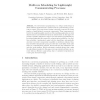193 search results - page 29 / 39 » Sequentialization of Parallel Logic Programs with Mode Analy... |
104
Voted
EUROPAR
2009
Springer
15 years 9 months ago
2009
Springer
The transition to multicore architectures has dramatically underscored the necessity for parallelism in software. In particular, while new gaming consoles are by and large multicor...
168
click to vote
HLPPP
1991
15 years 5 months ago
1991
Swarm is a computational model which extends the UNITY model in three important ways: (1) UNITY’s fixed set of variables is replaced by an unbounded set of tuples which are add...
134
click to vote
TRETS
2010
15 years 22 days ago
2010
s, and abstractions, typically enabling faster development times than with traditional Hardware ion Languages (HDLs). However, programming at a higher level of abstraction is typic...
146
Voted
WFLP
2009
Springer
15 years 9 months ago
2009
Springer
A logic program strongly terminates if it terminates for any selection rule. Clearly, considering a particular selection rule—like Prolog’s leftmost selection rule—allows one...
126
Voted
COORDINATION
2009
Springer
16 years 2 months ago
2009
Springer
Process-oriented programming is a design methodology in which software applications are constructed from communicating concurrent processes. A process-oriented design is typically ...


